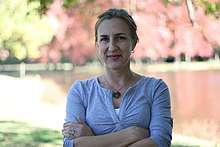Elizabeth Shakman Hurd
Elizabeth Shakman Hurd (born 1970) is an American political scientist. She is professor of political science and religious studies and holds the Crown Chair in Middle East Studies at Northwestern University in Evanston, Illinois.[1]

Academic career
Hurd was educated at Wesleyan University (B.A.), Yale University (M.A.), and Johns Hopkins University (Ph.D). She has taught at Northwestern University since 2002. Hurd is known for her work on Religion and politics in the United States, religion and Foreign policy of the United States, and religion and international relations. She also studies relations between the United States and the Middle East, particularly Turkey and Iran. Her writings have appeared in Boston Review, Public Culture, The Atlantic, Chicago Tribune, Foreign Policy, and The Washington Post. Her research has been supported by the Henry Luce Foundation and the American Council of Learned Societies/Luce Program in Religion, Journalism and International Affairs. She is a long-time contributor to The Immanent Frame digital forum on Secularism, religion, and the public sphere and a founding member of the Program in Middle East and North African Studies[2] at Northwestern University.
Selected publications
- The Politics of Secularism in International Relations (Princeton University Press, 2008)
- Beyond Religious Freedom: The New Global Politics of Religion ((Princeton University Press, 2015)
- Theologies of American Exceptionalism (co-edited, forthcoming, Indiana University Press, 2020)
- Politics of Religious Freedom (co-edited, University of Chicago, 2015)
- Comparative Secularisms in a Global Age (co-edited, Palgrave Macmillan, 2010)
References
- "Elizabeth Shakman Hurd". elizabethshakmanhurd.com. Retrieved 2019-12-27.
- "Middle East and North African Studies Program - Northwestern University". www.mena.northwestern.edu. Retrieved 2019-12-27.